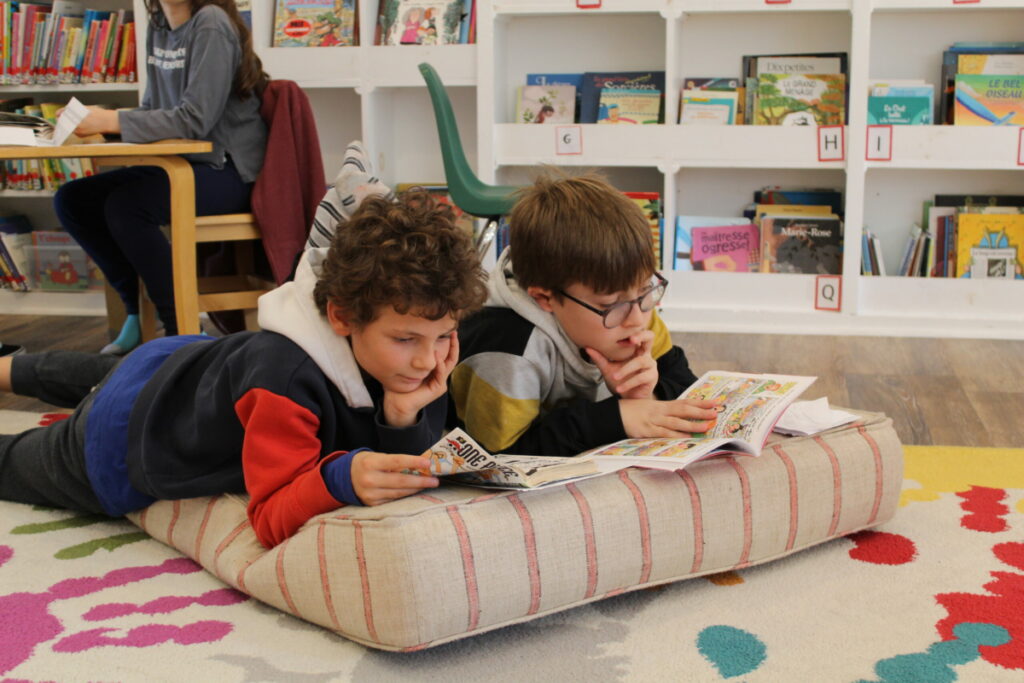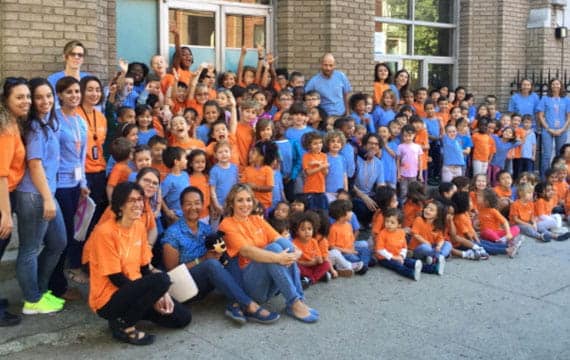As parents and teachers, we understand that our primary objective is preparing children for the future in a loving, safe way. But what does this look like, exactly, for a preschooler, an elementary-age child, or an early teenager? What does it mean to be autonomous at different ages? An understanding of children’s developmental milestones can help inform us of their cognitive capacity and their ability to manage heightened levels of responsibility as they grow. In this article we will discuss some of the characteristics of various developmental stages in children, how to support their autonomy, and how to delegate meaningful responsibilities that will help children become more disciplined and enthusiastic participants in both school and home life.
It’s important to note that the stages we outline here, and our advice about promoting autonomy, are general guidelines, and that individual differences exist. Children progress through these stages at different rates, and external factors, such as environment and culture, can influence development. Additionally, the transition from early childhood to adolescence is a dynamic and continuous process rather than a series of distinct phases.

Early Childhood (3-6 years)
Physical Development
- Fine motor skills improve during this period, allowing for activities like drawing, cutting, and writing with increasing precision and dexterity.
- Gross motor skills develop further, enabling better coordination and balance.
- Self-care skills are established and refined; children take pride in being able to say, “I did it by myself!”
Physical autonomy at this age comes as children become capable of taking care of themselves, stronger, and more dexterous and adept. It starts at home, with developing independence in daily tasks. Young children should be able to feed themselves with a fork or spoon, put on and take off their clothes, clean up their own toys, and begin to have an established sense of morning and evening routines. A mistake some caregivers sometimes make is “just doing it for them” – and there are moments, when the clock is ticking and it’s time to get moving, when that’s the best solution! But as much as possible, children should be allowed to practice taking care of themselves, with supervision and support only if necessary.
Children at this age are capable and eager to start helping out with household tasks. It is not too early to give your child small responsibilities, such as helping to set and clear the table, rinse and sort the recycling, and watering the plants. They can start to learn that household tasks aren’t magically completed and that everyone’s cooperation helps get things done. You can gradually introduce these chores with a visual reminder during the first several months, such as a chart or checklist that they can color in or add stickers to.
You can also consult this blog post for even more tips on supporting motor skill development to cultivate more physical autonomy.
Cognitive Development
- Language develops rapidly at this age, with an expanding vocabulary and increasing grammatical complexity in speech.
- This is when children begin to develop logical reasoning and problem-solving skills.
- Pre-mathematical concepts begin to emerge, such as counting, recognizing shapes and patterns, comparing sizes and quantities, and sorting.
As children begin thinking for themselves, recognizing problems and reasoning through solutions, they are becoming more autonomous. Encourage their independent thinking, first and foremost, by providing rich, high-quality language input. Narrate your actions and share your observations frequently. Model good grammar and complexity in your sentences; ask your child for their opinions and to explain what they’re doing. Demonstrate curiosity and a willingness to seek answers and reason through things out loud.
If you’re in a bilingual household, your child will almost certainly benefit from hearing both languages on a daily basis; constructing meaning in two languages strengthens neural connections and allows children to access deeper, more conceptual thought. Language development is strongly linked with cognitive growth, reasoning skills, and abstract thinking.
This is also an age when children benefit greatly from imaginative play, in which they invent scenarios and must find solutions to their imaginary problems. Construction games and puzzles will cultivate their spatial reasoning skills. Reading stories together frequently will open their minds to characters’ experiences and approaches to problems, and provide more access to rich language input. Exploring nature, getting outside and doing hands-on activities such as gardening or a hike, will provide a chance for children to make observations, ask questions, and learn about life and ecology in the world. All of these activities will help empower children to think for themselves.
Social and Emotional Development
- Basic social skills are formed at this age, primarily through interactions with peers.
- Children develop a sense of identity and self-awareness.
- Young children begin to construct an understanding of emotions and empathy.
Social and emotional development is of the utmost importance at this age; during preschool and kindergarten children cultivate the skills and resilience they will need in order to navigate social situations for the rest of their lives. We can support children’s emotional development by teaching them to recognize and label their emotions without judgment, and providing empathy and comfort in moments of emotional distress. When children feel calmer, teach them the Tucker the Turtle technique: Stop, Tuck (into your shell) and take 3 deep breaths, and Think about possible solutions. We can model compassion for our children and other people, characters in books and movies, or even imaginative people during make believe play. When children try to do new things, praise their efforts rather than the outcome; if they succeed, we can discuss which strategies worked well, and if they fail, we can talk to them about what they learned from the experience.
Cultivating social autonomy involves allowing children to explore relationships with their peers in both structured and unstructured environments. Most children, through practice and play, learn to negotiate solutions and compromises with each other, frequently without adult guidance. If conflict arises that children cannot solve, we can model using words to express our feelings and asking children to think about solutions that might work, perhaps using a “solutions toolkit” like the ones we have in our FAA classrooms. When children find solutions on their own, they are more likely to stick to them and be more satisfied with the results.

Middle Childhood (6-12 years)
Physical Development
Children are mostly physically autonomous at this age, but you can help them strengthen their bodies and improve balance and dexterity by providing lots of opportunities to move around, play, and explore. Help them find a physical activity that they enjoy, and encourage them to pursue it.
Cognitive and Academic Development
- As children’s thinking shifts from concrete to more abstract, they experience advancement in their logical thinking and problem-solving abilities.
- Their memory and attention span improves.
- They develop a deeper, more nuanced understanding of cause and effect.
- Academic skills are honed at this age, and children work on building their organizational and study skills.
Promote your child’s academic autonomy first of all by teaching them how to study and see tasks through. Not all children automatically know how to set aside time and space for independent learning; parents can help to establish good study habits. Teach them strategies for memorizing facts, thinking logically, and taking or reviewing notes. Talk to them about the content of their lessons, and ask them what facts resonate with them. At this stage, learning software and technology can be used (if you’re comfortable allowing it) within limits; for younger school-age children, it should still be semi-supervised.
Children’s responsibilities should not be limited to their homework and academic tasks. Make sure they’re given household chores and responsibilities that reflect their developing capabilities. Children can load and unload the dishwasher, take out the trash and recycling, help with household cleaning tasks, and help prepare meals. Allow them to participate more in decision making for the home, such as choosing meals and creating chores schedules.
A child’s self-care regimen should also be established and consistently enforced, including keeping their room neat, making their own bed, and learning to fold and put away their own clothes.
At around 8 or 9 years old, children’s math sense will be developed enough for you to start talking to them about money management. You can take them grocery shopping and talk about what things cost and why some things are more expensive than others. This is a good time to start giving them a small allowance, to instill responsible financial habits. Children can learn how to save their own money and not spend more than they can afford; they can learn small lessons about not always getting what you want, and sacrificing some things in order to appreciate others. The ability to delay and defer gratification is an important tool for avoiding impulsive and irresponsible spending habits. Start to teach it early.
Social and Emotional Development
- Children form deep friendships and social connections at this age.
- A sense of competence and self-esteem develops.
- Through interaction and observation, children learn to navigate and understand social norms.
- Morality begins to emerge, with a stronger sense of what’s right and wrong.
- Children can begin to internalize societal values and rules.
Starting at around 6 years old, your child’s sense of self really starts to exert itself, and their identity, values, judgments, and self-expression will continue to evolve. Children need parental guidance to reason through and understand tricky situations; they can begin to appreciate complex social problems and find their way through them, building independence as they do so. This is a time to cultivate a sense of justice and equity, and to start having philosophical discussions about morality. Your children are watching you, so model the values that you teach them, such as honesty, accountability, resilience, and open communication.

Early Adolescence (12-14 years)
At home, children between 12-14 years old are ready to handle greater responsibility, and they should be included in family discussions, with input in decision making about family plans, vacations, and household rules. They are capable at this age of learning to do their own laundry and doing household cleaning by themselves, and they can start to learn how to plan and cook some simple meals. Other aspects of self-care, such as getting enough sleep, practicing a healthy lifestyle, and maintaining personal hygiene should also be demonstrated and encouraged.
At this age, many children are trustworthy enough to receive their own electronic devices; at the same time, they are not yet capable of understanding these devices’ impact on their self-care and safety. Take advantage of the parental control functions to be sure that you’re aware of what applications your child is using, and talk to them about how and why they use their phone or tablet. Set a time limit on their usage, and make sure they understand why they shouldn’t be on a device during the hour before bedtime.
Cognitive Development
- Young teenagers have enhanced abstract and critical thinking abilities.
- They become more able to think about their own thinking (metacognition).
- They explore their personal identity, beliefs, and values more, developing a more nuanced understanding of moral and ethical issues.
Early adolescents’ academic autonomy can be cultivated by teaching them about time management. You might help your child create their own schedule, and discuss with them how to tweak it if they are struggling. Have frank conversations about the consequences of procrastination and work together to develop strategies to overcome it. During homework time, make yourself available if possible, but allow them freedom to complete their tasks on their own. Make sure they are responsible for their own choices: If your child forgets an important notebook for homework, it’s ok to not jump to their rescue, calling teachers and classmates’ parents to find the information they need; allow them to figure out a solution. The way they solve their problem might not be what you would have chosen, but the experience of taking ownership over their mistake is what matters.
Promoting critical thinking is another way to foster autonomy in your young teenager. Engage in discussions about media, news, and information sources. Encourage them to question and analyze information independently. Debate and discuss various topics, and promote the development of well-reasoned opinions. Ask your child to reflect upon why they have certain opinions with a nonjudgmental and open approach. Encourage them to reflect on their own experiences, choices, and personal growth. Discuss lessons learned and insights gained from various situations. As your child hones these critical thinking skills, they will be more prepared to handle academic challenges in an analytical, reflective, autonomous way.
Cultivate respect for diversity and different ways of doing things. Discuss different cultures, perspectives, and backgrounds, and emphasize finding the humanity and dignity of every individual and group, rather than focusing on their “otherness”.
Social and Emotional Development
- Young teenagers’ sense of their own identity becomes more complex and more stable.
- They seek increased independence and have a desire for autonomy.
- They become more trustworthy and can handle greater responsibility.
- They explore their personal interests, talents, and future aspirations.
- Relationships with peers become central, and interest in romantic relationships may also begin.
To promote social autonomy for young adolescents, take input about their interests and hobbies, and allow them to choose activities that align with their passions. It’s also an excellent time to introduce a few hours of community service into their monthly schedule, which promotes empathy and fosters a sense of social responsibility.
As children at this age become more invested in relationships with their peers, encourage them to develop a diverse social network of friends both from school and from other activities. Support their involvement in clubs or sports if possible. Work with them to manage a reasonable social schedule; set parameters together, and then allow them choices about how to spend their time.
When difficult social situations arise, strategize about constructive ways to solve problems, and discuss healthy friendship dynamics. Your young teenager may need reminders about the importance of mutual respect, support, and communication in their friendships. Help them articulate their own values and navigate social situations in alignment with those values.
Make sure your child knows how to set boundaries, and respect others’ boundaries, for both in-person and online interactions; adolescents need guidance in learning how to practice responsible use of social media. Children can also benefit from hearing about strategies you’ve developed to maintain boundaries. Consider sharing stories highlighting the lessons you learned when you were younger, about the importance of social autonomy, self-respect, and responsible decision making. Try to avoid idealizing those times or mentioning how different life used to be; the universal truths about learning self-respect should be emphasized instead!
All of this is meant to help prepare children for difficult social situations; however, they must be allowed to experience the consequences of their own behavior (as long as they’re not in any danger) in order to develop a stronger sense of responsibility for themselves. There might be times when they find themselves in the company of friends they don’t quite trust, or feeling uncomfortable with the words or actions of others. In those moments, they are fine-tuning their own sense of right and wrong, and finding strategies to protect themselves.
Adolescence can be an emotional time. Support their emotional independence by acknowledging and validating their feelings without judgment, while still encouraging reflective thinking and strategies for managing and expressing emotions. Some children keep a diary of their thoughts, which should remain private to them unless they choose to share it with you.
To sum up …
Children of all ages should learn to manage their bodies and their possessions on their own. They should be given responsibilities at home, as well as input about the things they can do and eat, and the activities the family does together. Children need time management and study skills to be taught, modeled, and reinforced. Consistent, rich language input and interesting conversations should be present during family time and meals. Finally, providing compassion, empathy, and non-judgmental advice is a responsibility that parents will always have. These strategies will help our children develop into independent, trustworthy high school and college students.







